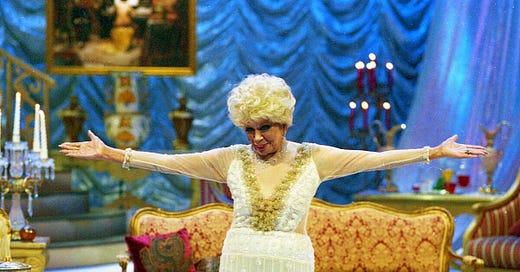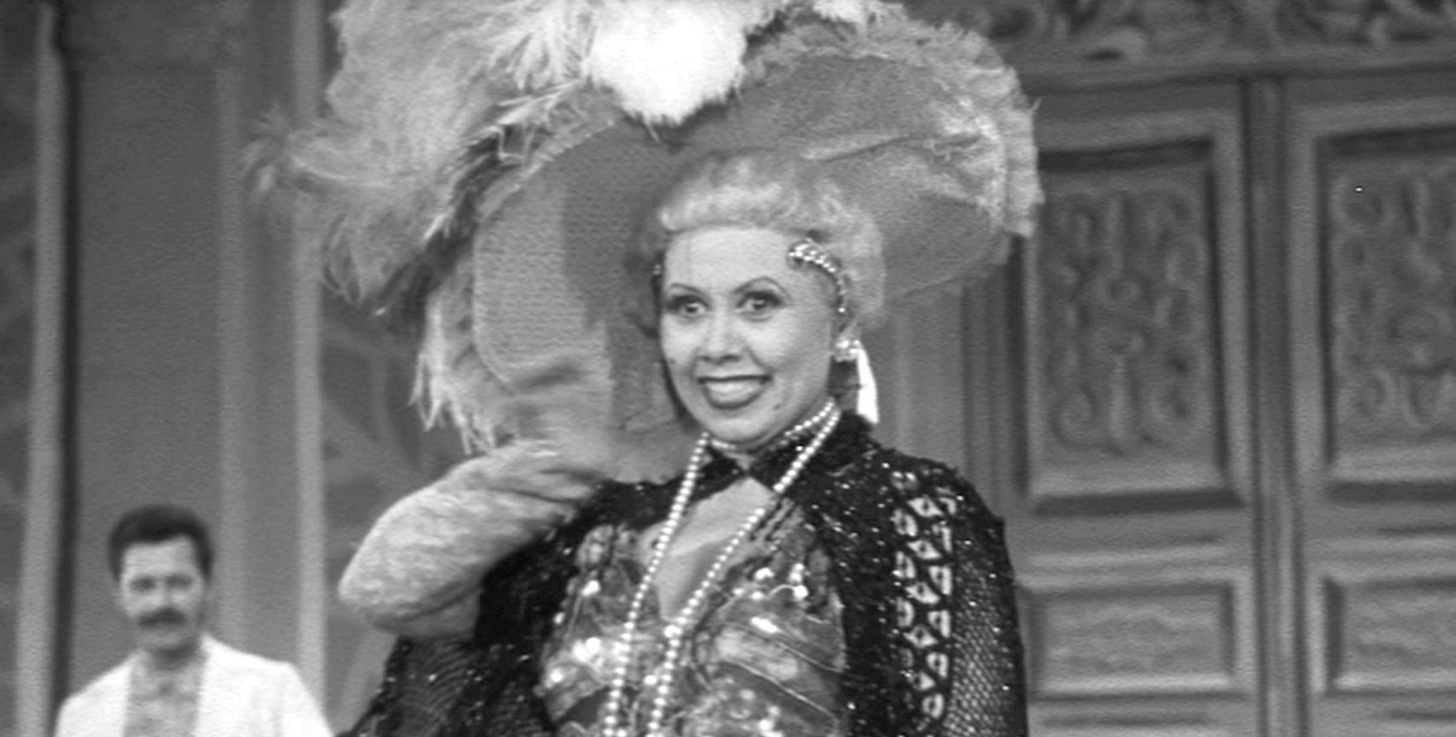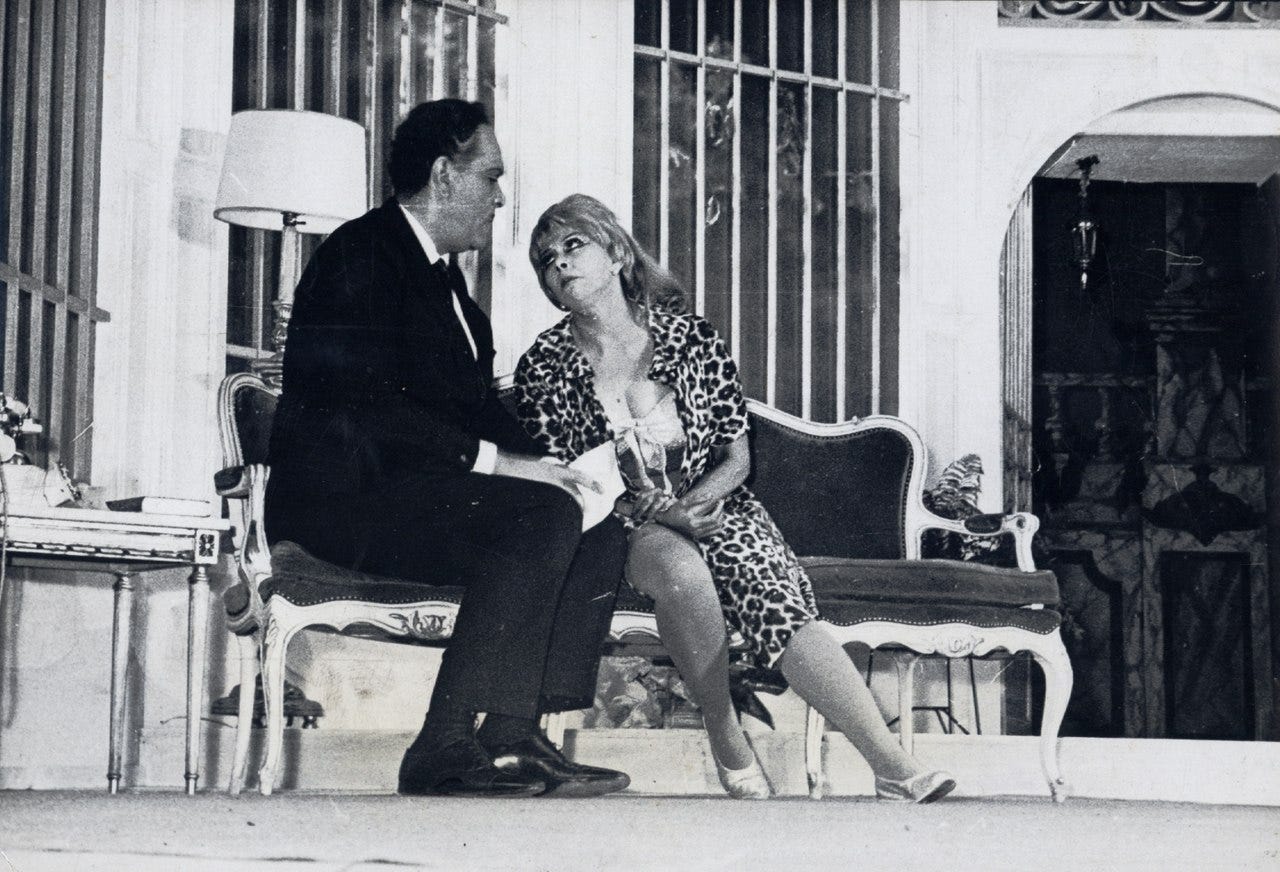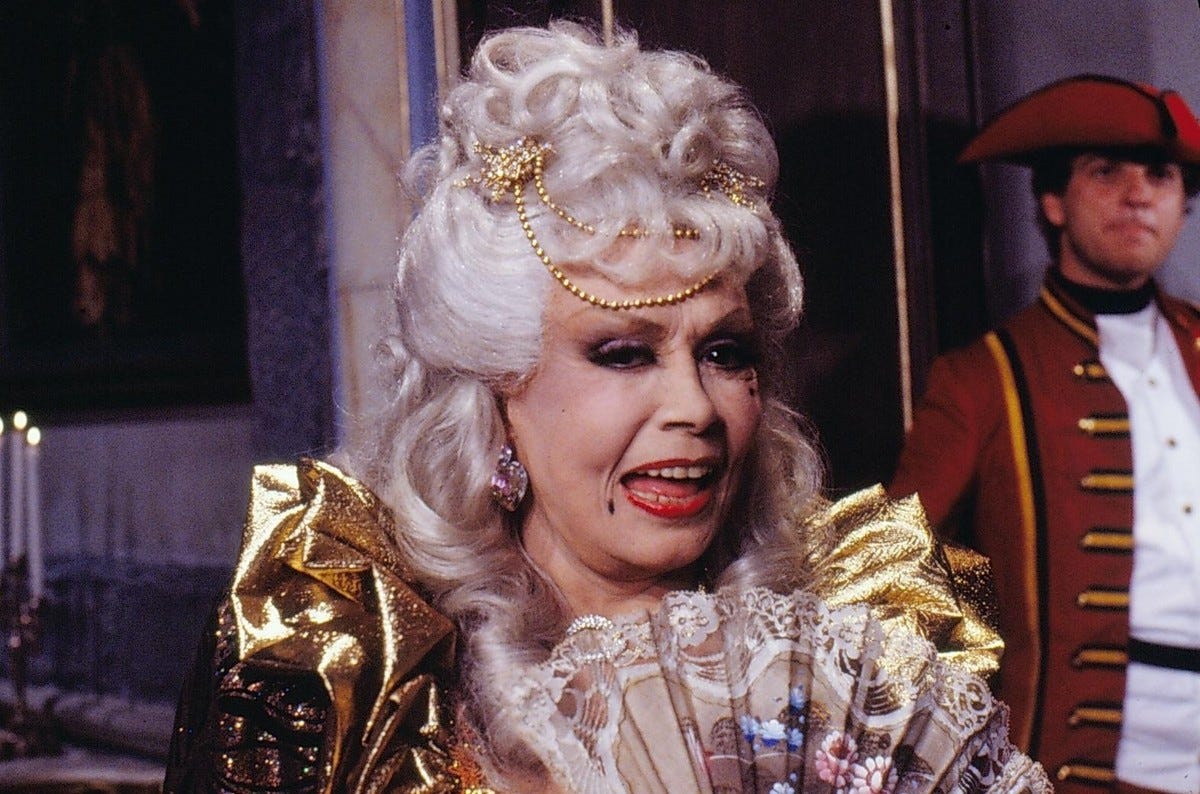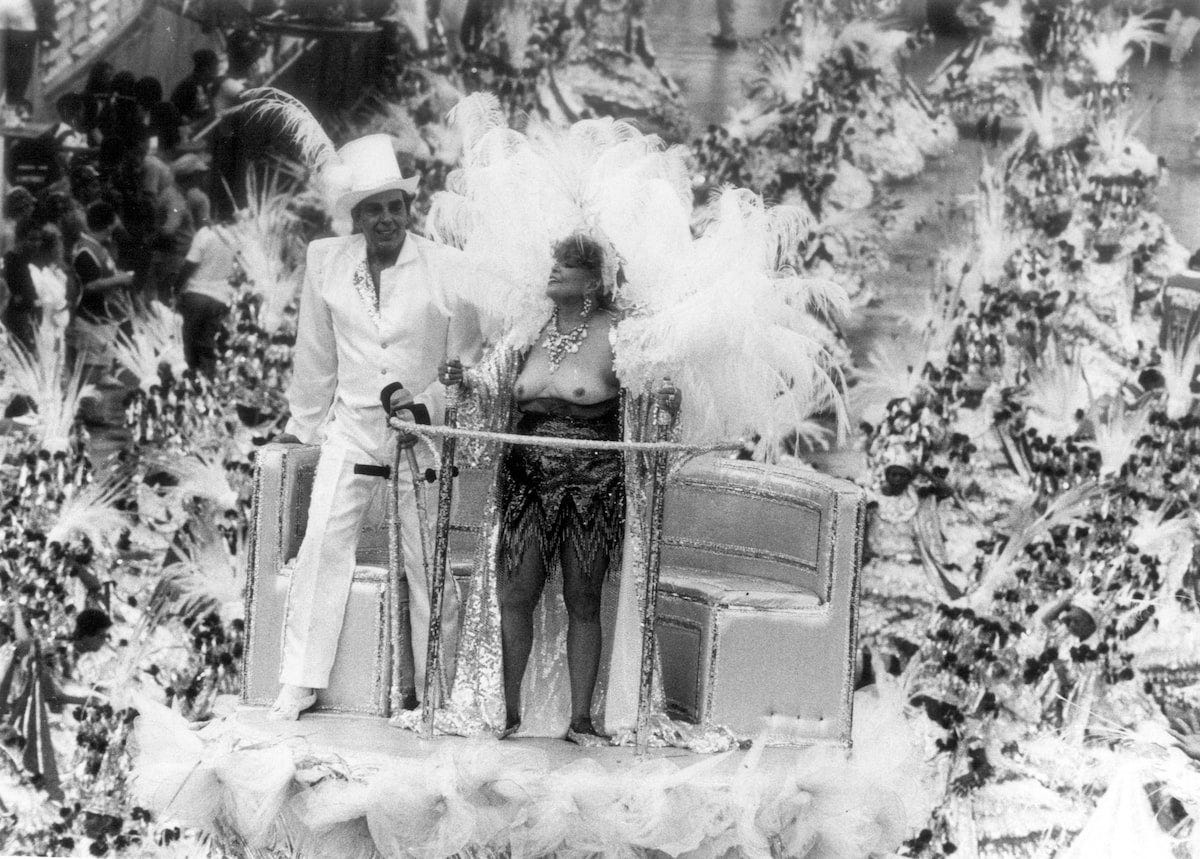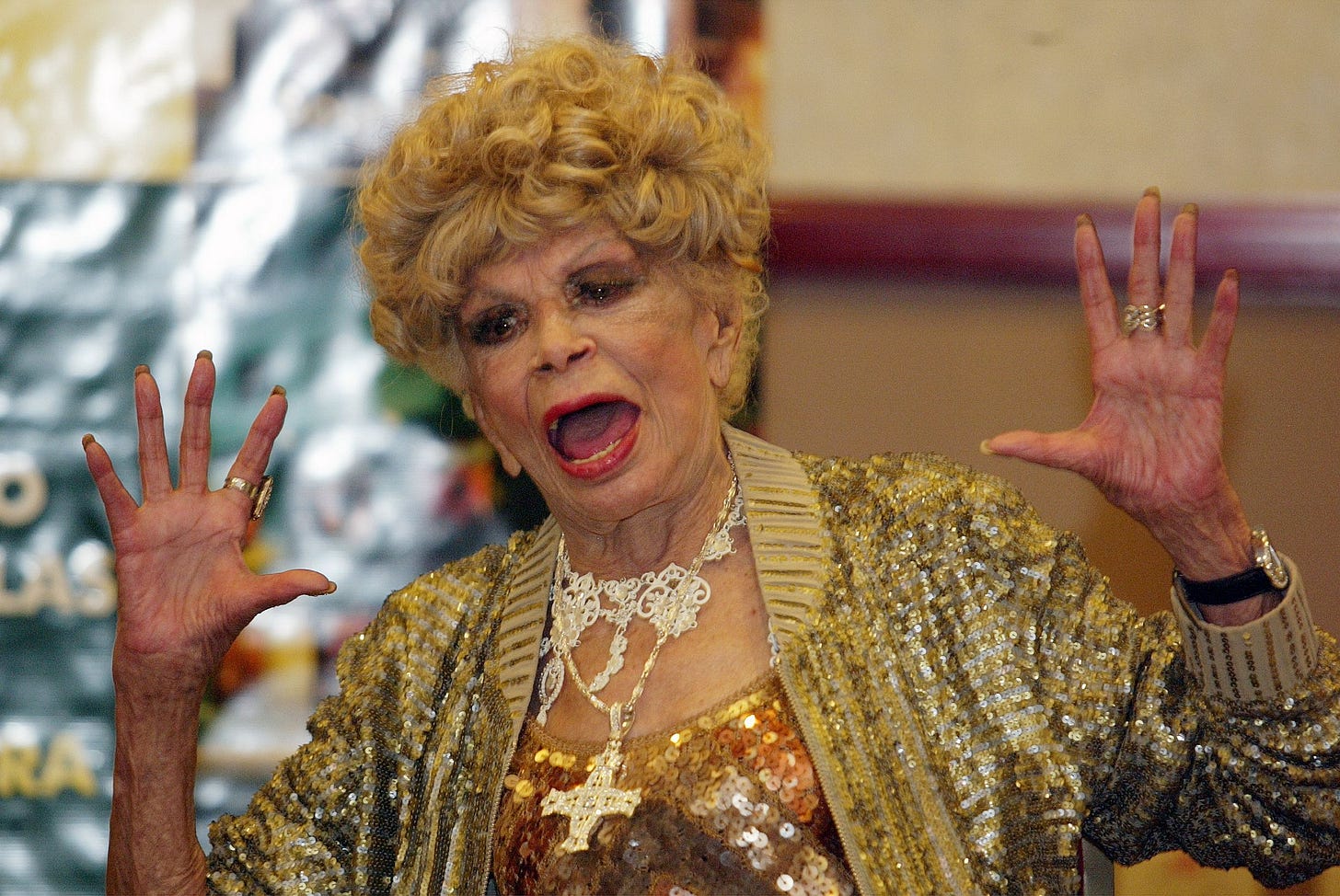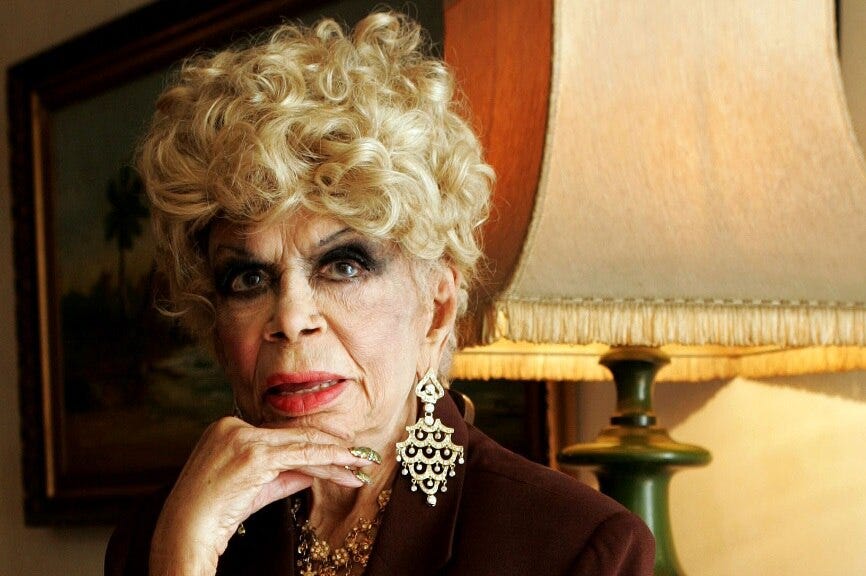Dercy Gonçalves. Just saying her name is like conjuring a storm of expletives. In a country that prides itself on carnival flamboyance, samba beats, and expressive gesticulation, Dercy somehow managed to stand out. This is no small feat. She was Brazil’s national monument to vulgarity, the high priestess of profanity. She didn’t just push the boundaries; she demolished them with a sledgehammer, then danced in the rubble. If Chacrinha was Brazil’s circus ringmaster, Dercy was its heckler—spitting back at society with a gnarled grin and a cigarette dangling from her lips.
Let’s get one thing straight: Dercy Gonçalves did not care what you thought. She didn’t care what anyone thought. Her philosophy, if we’re generous enough to call it that, could be boiled down to one word, a word that I’ll refrain from using here in the interest of decorum—but that Dercy would’ve shouted from the rooftops without hesitation. To call her a comedian feels inaccurate—comedians tell jokes, comedians aim for punchlines. Dercy Gonçalves aimed for the jugular. She was less a comedian and more a human cannonball of irreverence, and her act didn’t come with a safety net.
Born Dolores Gonçalves Costa on June 23, 1907, in the modest town of Santa Maria Madalena, Dercy’s beginnings were as unglamorous as they come. Her mother was a washerwoman; her father, a railway worker and occasional drunk. There was no stage in sight—only dust, hunger, and an early lesson in the cruelty of being poor, female, and loud in a world that punished all three. She sold sweets as a child and grew up between the Bible and beatings, expected to be silent, chaste, and invisible. So she chose the opposite. She ran—not just from home, but from respectability itself.
Running away in her teens to join a travelling theatre troupe—scandalous, of course, especially for a girl who was supposed to become a decent housewife—she quickly learned that the stage was her battleground and laughter her weapon. She didn’t just run from home; she sprinted away from obedience, silence, and shame. If life gave her no stage, she built her own with leftover wood and verbal dynamite.
Her start in showbiz was anything but glamorous. Performing in seedy venues and scraping by on meagre wages, she carved out a space for herself with sheer audacity. Her raw, untamed style was unlike anything audiences had seen before, and it didn’t take long for her to go from struggling performer to scandalous sensation. In a time when women were meant to be discreet, Dercy was the noise. While radio and theatre slowly opened their doors to female voices, hers crashed through the window, screaming obscenities and cackling while doing it.
By the 1940s and 50s, she was already a controversial household name—though not necessarily one mothers mentioned in front of their children. Still, everyone knew her. You couldn’t look away. She had the morbid appeal of a car crash and the joyous irreverence of a drunk aunt at Christmas. Her comedy was an assault on propriety, a direct challenge to Brazil’s often hypocritical sense of decorum. While many of her contemporaries softened their edges to appeal to mainstream audiences, Dercy leaned into hers with all the subtlety of a freight train.
Her routines were peppered with expletives, her critiques merciless, her delivery unapologetically loud. She wasn’t simply telling jokes. She was dismembering the nation’s hypocrisies on stage. She didn’t just curse—she weaponised profanity, using it like a surgeon’s scalpel to expose the rot beneath Brazil’s patriarchal and religious veneers. Her performances made audiences gasp and laugh in equal measure. No topic was off-limits—politics, sex, death, menopause, the dictatorship, the Church, God himself. If there was a line, Dercy crossed it, lit a cigarette on the other side, and pissed on the border.
It’s tempting to reduce Dercy to her foul mouth—many did. But that would be missing the point. Her vulgarity wasn’t gratuitous. It was tactical. She wasn’t merely saying bad words; she was detonating linguistic grenades in the living rooms of middle-class respectability. For Dercy, no topic was off-limits—politics, sex, religion, her own ageing body. She was a master of turning the sacred into the absurd, exposing the ridiculousness of social conventions with a laugh that felt both liberating and dangerous. She wasn’t here to make you comfortable; she was here to make you laugh despite yourself, to shock you into seeing the world from her irreverent perspective.
She made films. Over thirty of them. From the 1930s to the 1970s, she was one of the most recognisable faces in chanchada cinema—those Brazilian musical comedies that mixed slapstick, sex, and samba. But even in that colourful genre, she stood out. She wasn’t a bombshell or a crooner; she was a verbal grenade with legs. In Cala a Boca, Etelvina! she was a cleaning lady with a vocabulary that could melt varnish. In Os Dois Ladrões, she played a maid who outsmarts everyone and steals the film. She took the background roles traditionally given to women and turned them into comic centrepieces.
She did theatre—hundreds of plays, across decades, many of them vaudeville-style revues written just to showcase her outrageous humour. Her stage career was relentless. She had the stamina of a boxer and the tongue of a pirate. And television? She practically squatted there for fifty years. From guest appearances to leading her own variety shows, she went from black-and-white screens to high-definition, always with the same mischievous glint in her eye. She was banned and unbanned, censored and celebrated, bleeped out and brought back. Censors hated her. Ratings loved her.
Her interviews were legendary. She didn’t just give interviews—she hijacked them. She turned the cold lights of the studio into a confessional booth where she told stories of back-alley abortions, stolen lovers, backstage orgies, and existential dread. All with the casual tone of someone describing a breakfast recipe. When asked if she believed in God, she replied: “I believe in Him, but I think He’s got a filthy sense of humour.” It was never clear if she was performing or just being—because for Dercy, there was no difference.
Her live interactions with the media, however, belonged to a different genre altogether—more combat sport than conversation. Journalists and talk show hosts who dared to sit across from her often found themselves in a verbal boxing match, caught in her web of sharp wit, defiant expletives, and ruthless observations. There was the time she told a news anchor live on air: “You look like a virgin who just found out where babies come from.” He blinked. The audience roared. Dercy didn’t flinch. It wasn’t shock value—it was truth-telling in a feathered hat.
Her appearance was a rebellion in itself. With clownish makeup, teased hair, and neon sequins stitched together like patchwork chaos, Dercy dressed not for elegance but for impact. She looked like Carmen Miranda’s ghost had crash-landed in a drag show. It wasn’t about beauty—it was about visibility. She refused to fade, and every outrageous ensemble screamed: I’m still here. Look at me. And now that you’re looking, listen to this filthy joke about your mother.
And here’s the thing: she wasn’t pretending. She wasn’t satirising femininity—she was burning its rulebook. Her feminism was unintentional but revolutionary. She never read Simone de Beauvoir, but she lived defiance with every breath. While other women in entertainment softened their edges to be “likable,” Dercy sharpened hers to a blade. She wasn’t interested in being adored. She demanded attention—and she got it. She shattered the ideal of the submissive, soft-spoken woman and replaced it with the image of a ninety-year-old in a feather boa yelling obscenities at a sitting minister.
That image—the elderly woman, loud and unashamed—might be Dercy’s greatest contribution to Brazilian culture. In a world that discards older women like expired yoghurt, she became their chaotic avatar. Her unapologetic embrace of her age was perhaps her boldest move. While the industry tossed aside older women like spoiled fruit, Dercy flaunted her longevity like a trophy. In a world obsessed with youth, she talked openly about her plastic surgeries, once declaring, “I’ve been under the knife more times than a piece of beef.” She celebrated her wrinkles, her sagging skin, her survivor’s body—turning age itself into a punchline and a protest.
She lived long enough to become not only a legend but a contradiction. She was a staple of prime-time television, even as censors scrambled to mute her mid-sentence. One moment she was on Programa do Jô, throwing shade at the Catholic Church; the next, she was on Domingão do Faustão, in a sparkly leotard, making sexual jokes that would make Freud blush. Dercy became an institution—despite herself.
The same defiance that coloured her stage persona extended to every corner of her life. Dercy’s unapologetic rejection of social expectations, particularly those surrounding women in the entertainment industry, set her apart from her peers. While many female performers in Brazil adhered to the traditional norms of beauty, grace, and restraint, Dercy seemed determined to break every rule. She challenged not just the establishment but also the very conventions of femininity, daring to be loud, brash, and wholly herself, regardless of the consequences.
And here lies the final, exquisite irony: the woman who once made bishops faint and censors foam at the mouth eventually got a parade in her honour from the mayor of her native land. The same political class she ridiculed on live TV now built her statues and declared Dercy Day. The saint of scandal turned into folklore. Respectability swallowed her whole—and belched. But even bronze couldn’t silence her. That grin, frozen in metal, still says: “Vai se foder.”
She lived in a way that made death look embarrassed. When she passed away on July 19, 2008, at the age of 101, she left instructions for a funeral that was as audacious as she had been in life. Her glass-topped mausoleum allowed admirers to see her one last time, a final act of defiance against the conventions of mortality itself. Even in death, Dercy refused to be ordinary. Her tomb in Madalena became a pilgrimage site—not of reverence, but of irreverence. People didn’t cry. They laughed. They remembered. They swore in her honour.
There’s a reason she’s so hard to imitate: Dercy wasn’t performing madness—she was conducting it. With orchestral flair. Her legacy isn’t just in the punchlines or the shock value. It’s in the freedom she embodied, the authority she undermined, the masks she ripped off of Brazil’s sacred cows. She wasn’t sophisticated, she wasn’t elegant, and she wasn’t trying to be. What she was—what she insisted on being—was free. And that’s far more dangerous.
She might not have been the type of entertainer who wrapped her audience in the warm embrace of clever wit or pleasant observation, but she was one who held up a mirror to the ugly, the uncomfortable, and the unspoken. Her comedy never played it safe; instead, it leaned into the mess of human existence, pointing out the absurdity of our social mores, and doing so with a knowing wink and a wicked laugh. The dissonance between her unflinching honesty and the polished, saccharine world of Brazilian entertainment made her a true iconoclast, one who carved her own path in a world that often demanded conformity.
What can be said about Dercy Gonçalves that hasn’t already been shouted, laughed, or cursed in her honour? She wasn’t a polished icon of comedy or a carefully curated celebrity. She was raw, messy, chaotic—and utterly unforgettable. Her legacy isn’t one of refinement or respectability but of breaking barriers and challenging norms with an unrelenting ferocity.
Dercy didn’t just entertain; she provoked, she disrupted, she forced her audiences to confront the absurdity of their own taboos. She was a reminder that humour doesn’t have to be polite to be profound, that sometimes the most important thing a comedian can do is hold up a mirror and laugh at what they see.
She spat in the face of decorum, flipped off propriety, and lived like every stage was a battleground—and every laugh, a victory. Love her or hate her, Dercy Gonçalves didn’t just belong to Brazil. She belonged to that rare pantheon of performers who refused to be forgotten—because forgetting her would be impossible. She wasn’t made to be remembered gently. She was made to echo—loudly, rudely, brilliantly—forever.

